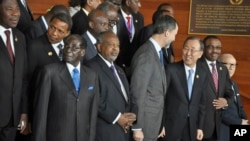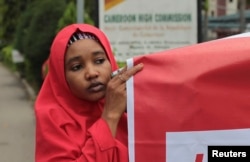The African Union on Friday endorsed plans for a regional force of 7,500 troops to fight militant group Boko Haram.
Word of the endorsement came as the AU opened its annual summit in the Ethiopian capital, Addis Ababa.
Nigeria, Cameroon, Chad, Niger and Benin recently agreed to work together against the militants, who have killed thousands of civilians in Nigeria, and control large parts of Borno state on the borders with Cameroon and Lake Chad.
AU Peace and Security Council commissioner Smail Chergui said the plan will be submitted to the United Nations Security Council.
Witnesses said that Chadian troops already active in Nigeria retook the village of Malumfatori from Boko Haram fighters on Thursday.
Boko Haram
Boko Haram
- Based in the northeastern city of Maiduguri
- Self-proclaimed leader is Abubakar Shekau
- Began in 2002 as a nonviolent Islamist splinter group
- Launched uprising in 2009
- Has killed tens of thousands since 2010
- Boko Haram translates to "Western education is sinful"
- Wants Nigeria to adopt strict Islamic law
Boko Haram and the West African Ebola outbreak are expected to dominate the summit agenda.
Mugabe chosen as chairman
Meanwhile, African leaders have elected Zimbabwe's President Robert Mugabe as the AU's new chairman.
The 90-year-old leader replaces Mauritania's president Mohamed Ould Abdel Aziz.
The Zimbabwean president brings decades of experience to the position, as one of the few modern leaders who was present at the founding of the Organization of African Unity, the predecessor to the AU, more than five decades ago.
In his speech at the summit Friday, Mugabe said the ideals of the organization’s past should influence its future course. He would emphasize the issues of climate change, agriculture and infrastructure development, he said.
"As we move forward with this noble agenda, we must emulate and draw inspiration from the principled stand and selfless sacrifices that our forebears made to bring us a strong and united Africa that we are so proud of today," he said.
But Mugabe also brings with him some baggage, as a leader who has often been criticized for clinging to power and brutally suppressing his opposition.
Amnesty International released a statement urging Mugabe to use his one-year term as chairman to address human rights concerns, including within his own country.
Mugabe, who famously ordered the seizure of land owned by white farmers in Zimbabwe, also turned up the anti-colonial rhetoric while urging the continent to better protect its own natural resources.
"African resources should belong to Africa and to no one else, except to those who we invite as friends," he said. "Friends we shall have, yes, but imperialists and colonialists no more."
UN chief offers advice
In an opening address to the summit, United Nations Secretary General Ban Ki-moon urged African leaders not to cling to power.
"Modern leaders cannot afford to ignore the wishes and aspirations of those they represent," he said.
African leaders have met increasing resistance to efforts to extend their terms. Last week, opponents of Congo's President Joseph Kabila forced changes in a new electoral law that in its initial form would have allowed the president to stay in office while a national census was held.
In October, Burkina Faso's president Blaise Compaore was forced to resign after 27 years because of protests against changing constitutional term limits.
Security dominates agenda
While the theme of this year’s AU summit is women’s empowerment, much of the official agenda and sideline meetings have focused on security issues, especially the Boko Haram insurgency in Nigeria.
The AU leaders’ plan for a regional military force to fight the insurgents is based on a model that has been deployed in Mali and Central African Republic.
AU Commission Chairwoman Nkosazana Dlamini Zuma said the threat calls for a "collective, effective and decisive" response.
"The senseless killings, the destruction of property, the enslavement and sale of our people, especially girls kidnapped and married off, the terrorization of villages are a threat to our collective safety, security and development," she said.
Regional leaders are also searching for a solution to the civil conflict in South Sudan, bringing together the warring factions to try to reach a power-sharing agreement in the coming days.
Thousands of people have died in the conflict, which began in December 2013, while numerous attempts at a peace agreement have so far fallen though.
The East Africa group of nations IGAD is to hold a summit Saturday in Addis Ababa with South Sudan’s leaders to try to forge a lasting deal.













